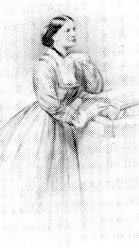Planning worship?
Check out our sister site, ZeteoSearch.org,
for 20+ additional resources related to your search.
- |
User Links
Person Results
Mary Peters
1813 - 1856 Person Name: Mary B. Peters Author of "Lord, We See the Day Approaching" in The Cyber Hymnal Also known as Mary P. Bowly
=======
Peters, Mary, née Bowly, daughter of Richard Bowly, of Cirencester, was born in 1813, and subsequently married to the Rev. John McWilliam Peters, sometime Rector of Quennington, Gloucestershire, and died at Clifton, July 29, 1856. Her prose work, The World’s History from the Creation to the Accession of Queen Victoria, was published in seven volumes. Several of her hymns were contributed to the Plymouth Brethren's Psalms, Hymns, and Spiritual Songs, London, D. Walther, 1842. These with others, 58 in all, were published by Nisbet & Co., London, 1847, as Hymns intended to help the Communion of Saints. Dr. Walker introduced several from these collections into his Cheltenham Psalms & Hymns, 1855. Many of these have been repeated in Snepp's Songs of Grace & Glory, 1872. and other Church of England hymnbooks. These include, besides those annotated under their respective first lines :—
i. From Psalms, Hymns, & Sacred Songs, 1842:—
1. Blessed Lord, our hearts are panting. Buria. Given in later collections as "Blessed Lord, our souls are longing."
2. How can there be one holy thought! Holiness through Christ.
3. Jesus, how much Thy Name unfolds. The Name of Jesus.
4. Lord, we see the day approaching. Second Advent.
5. 0 Lord, we know it matters not. Taught by the Spirit.
6. The murmurs of the wilderness. Praise to Jesus.
7. The saints awhile dispersed abroad. God within us.
8. Unworthy is thanksgiving. Jesus the Mediator.
9. Whom have we, Lord, but Thee. Christ All in All.
10. With thankful hearts we meet, 0 Lord. Public Worship.
From her Hymns, &c, 1847:—
11. Earth's firmest ties will perish. Burial.
12. Enquire, my soul, enquire. Second Advent.
13. Hallelujah, we are hastening. Journeying Heavenward.
14. Holy Father, we address Thee. Holy Trinity.
15. Jesus, of Thee we ne'er would tire. Holy Communion.
16. Lord Jesus, in Thy Name alone. Holy Communion.
17. Lord, through the desert drear and wide. Prayer for Perseverance.
18. Many sons to glory bring. Security in Christ.
19. 0 Lord, whilst we confess the worth. Dead in Christ. Sometimes it begins with st. ii., "Dead to the world we here avow."
20. Our God is light, we do not go. Christ the Guide.
21. Praise ye the Lord, again, again. Public Worship.
22. Salvation to our God. Passiontide.
23. The holiest we enter. Public Worship. Sometimes given as "The holiest now we enter."
24. Through the love of God our Saviour. Security in Christ.
25. Thy grace, 0 Lord, to us hath shown. Offertory.
26. We're pilgrims in the wilderness. Life a Pilgrimage.
-- John Julian, Dictionary of Hymnology (1907)
Mary Peters
W. H. Jude

1851 - 1922 Composer of "GALILEE" in Hymns of the Second Coming of Our Lord Jesus Christ William Herbert Jude United Kingdom 1851-1922. Born at Westleton, Suffolk, England, his family moved to Norfolk. A precocious child, by age eight he was composing music for school plays. Educated at the Liverpool Organ School and East Liverpool College of Music, he became college principal for awhile. He married Catherine Helena Haigh. They had no children. He became a composer, editor, and organist. He was organist for the Blue Coat Hospital & School and Stretford Town Hall near Manchester, while teaching and lecturing. After 20 years there he was appointed organist at the Exeter Hall in London, a primary venue and Christian Centre owned by the YMCA on the Strand in London. As a recitalist, he was asked to “open” over 1000 new organs across the UK, Ireland, and Australia. He was considered the most brilliant organist of his day. He wrote at least two operettas: “Innocents abroad” (1882) and “The mighty deep” (1917). His compositions were frequently religious. He admired British evangelist, Rodney “Gipsy” Smith and published a collection of Smith’s favorite solos in 1903. He also supported the temperance movement. He toured Australia and New Zealand 1890-1894. In 1904 he served as editor for several musical periodicals, including “Monthly Hymnal”, “Minister of music”, and “The Higher life”. He also compiled several hymnbooks, including “Mission hymns” (1911”), and “Festival hymns” (1916). He wrote a number of works on music. He died in London.
John Perry
W. H. Jude
Charlotte Alington Barnard

1830 - 1869 Composer of "BROCKLESBY" in The Cyber Hymnal Mrs. Charles Barnard, usage: Claribel. See also Claribel, 1830-1869
Charlotte Alington Barnard


 My Starred Hymns
My Starred Hymns


